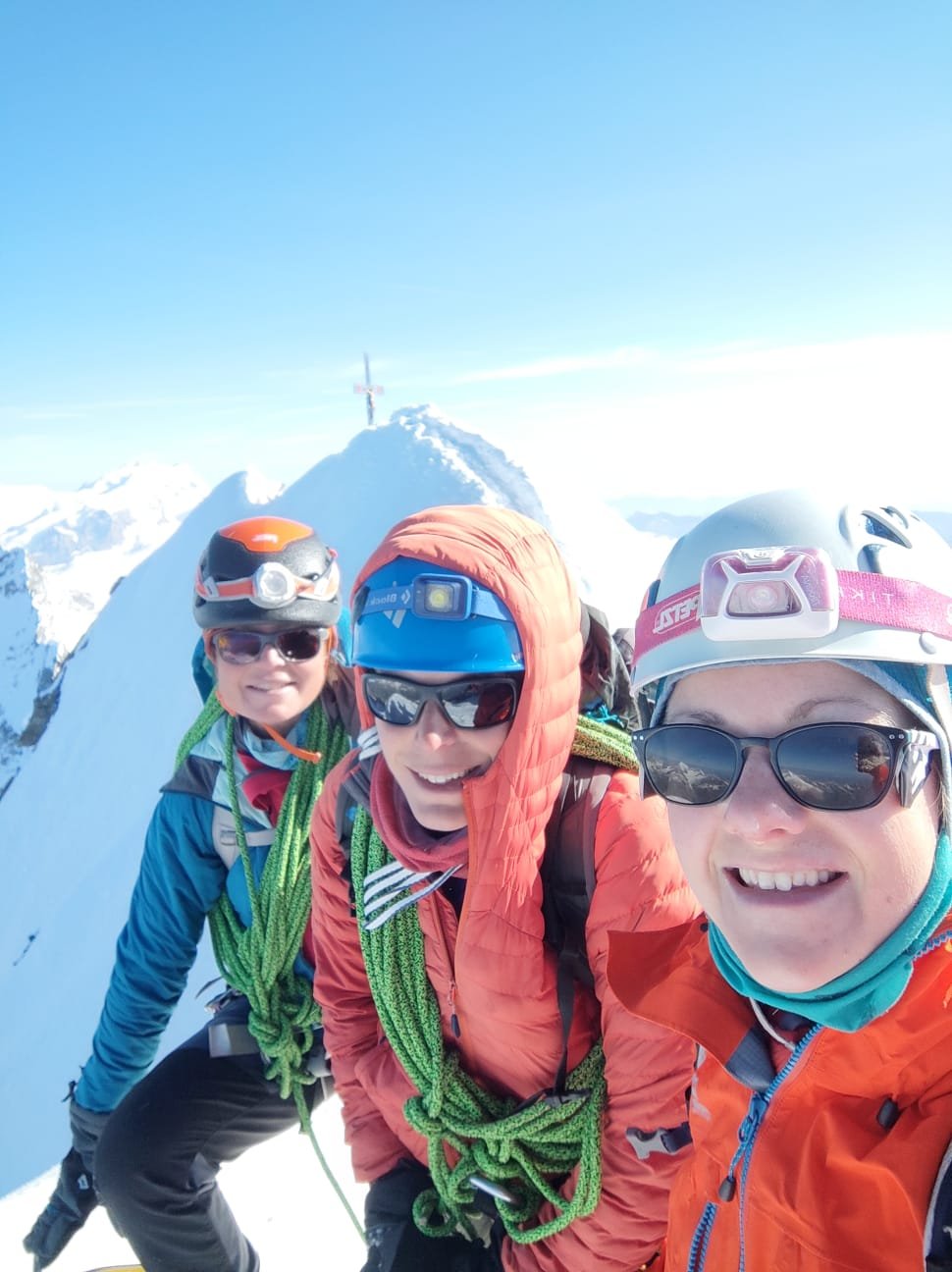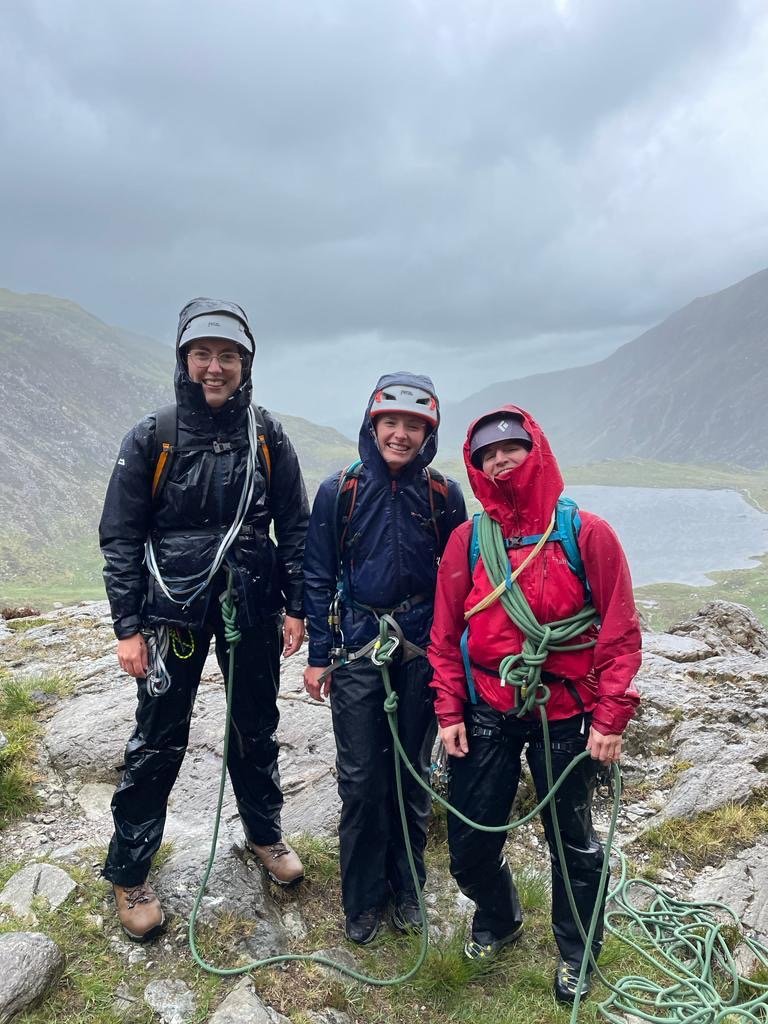Fitness and Experience Recommendations for Courses
Which course is the right level for me?
We aim to provide courses for a range of experience levels; whether you’re a complete beginner or more experienced and looking to learn more advanced skills, there should be a course for you.
Alpine Courses
Experience (Higher mountains - Alps, Pyrenees)
Introduction to Alpine Mountaineering
This is aimed at people looking for their first alpine mountaineering experience!
Experience with axe and crampons and roped rock climbing is not essential, as skills are taught from beginner level.
Development Mountaineering Courses
This is aimed at people with some alpine climbing or UK winter (grade 2/3) and rock climbing experience who want to learn how to take their skills to the next level.
Experience walking/climbing with an axe and crampons is essential, as is experience in roped rock climbing. Knowledge of crevasse rescue and glacier travel is useful (though this can be revisited on request).
Experience (UK mountains)
Alpine Rope Skills
This is aimed at those of you who have experience scrambling, or rock climbing and wish to learn the skills to do this safely in the higher mountains. If you are coming from a scrambling background, knowledge of rope techniques is not essential as these can be covered from beginner level. You will be on Grade 2 and 3 scrambles during the course.
Introduction to Scrambling
This is aimed at those of you who love being in the mountains but have not yet ventured towards steeper rocky terrain and want to learn how to do this safely. You will be on Grade 1 scrambles, therefore knowledge of rope techniques is not necessary.
Fitness (Alps, Pyrenees)
A good level of fitness is necessary. Alpine hut approaches can involve 1000m+ ascent, and summit days can involve another 1000m+ and be 6+ hours long.
Don’t let this put you off if this sounds daunting. If you are comfortable with long days hill walking in the UK with a decent sized rucksack, hitting the required fitness level for beginner mountaineering is well within your reach. Doing a bit of training before your trip is always a good idea; head out into the hills if you can, go on a run, or strengthen those legs in the gym - every little helps!
Fitness (UK mountains)
A good level of fitness is required for these courses. You should be comfortable on a long day hill walking in areas such as (or equivalent to) the Lake District, Eryri National Park, or the Scottish highlands, and have a head for heights and exposure!
Rock Climbing Courses
Experience
Introduction to Outdoor Climbing
This is aimed at beginners to outdoor climbing. You should be comfortable climbing indoors and belaying your partner. Ideally you should be able to lead belay.
Introduction to Lead Climbing
For those of you who are comfortable climbing outdoors and want to take the next step. Having some knowledge of rope work is helpful but not essential. Ideally you should be able to lead belay.
Development Lead Climbing
For those of you who are comfortable lead-climbing outdoors but wish to refine your skills, improve your confidence, or push your grade. You must be able to lead belay.
Introduction to Multi-pitch Climbing
This is aimed at beginners to multi-pitch climbing. You should be confident in lead climbing single-pitch routes and be ready to take the next step. Having some knowledge about multi-pitch rope work is helpful however everything will be covered on the course.
Development Multi-pitch Climbing
For those of you who are comfortable and experienced in multi-pitch climbing but wish to refine your skills, improve your confidence, or push your grade.
FItness
Introduction to Outdoor Climbing and Lead Climbing courses
If you are reasonably active and comfortable on a full-day walk in the hills, or used to climbing either indoors or outdoors for a day, you should be more than happy on these courses. Walks to single-pitch crags tend to be reasonably short.
Multi-pitch Courses
A good level of fitness is required for these courses. You should be comfortable on a long day hill walking or climbing on a route for a few hours at a time. Walks to multi-pitch crags can sometimes (not always) be longer and include a reasonable amount of uphill hiking with a heavy rucksack.
Scottish Winter Mountaineering/Climbing
Experience
Introduction to Winter Skills
This is aimed at complete beginners in the snowy mountains. You need to have experience in summer hill walking but will be introduced to crampons, ice axes, navigation skills, and avalanche forecasts.
One Axe Summits
This is aimed at those of you who have some experience in the snowy mountains and are comfortable using crampons and axes. You might have completed a formal winter skills course before or just been out with friends.
Intro to Winter Mountaineering
You are comfortable walking in the winter mountains with ice axe and crampons and want to add in ropes! Having some experience with summer rock climbing or mountaineering would be helpful but not essential.
Winter Climbing
Bespoke course tailored to your experience (Instructor ratio 1:2). Ideal for anyone, whether you’re a beginner, or already have some experience and want to push your grade or improve your skills.
Winter Mountaineering Development
This course is aimed at those who have already ventured into steeper winter terrain and are looking to tackle graded I/II axe routes with the safety of a rope and rack. Leading Edge offers a guided experience or provides you with the instruction and support to start leading these routes yourself.
Fitness
A reasonable level of fitness is required as Scottish Winter Mountaineering usually involves long and arduous days out in the cold. You should be comfortable walking for a few long days in the hills in summer with a heavy bag.



















